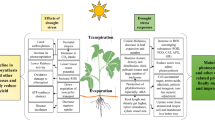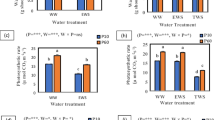Abstract.
Using root- and cell-pressure probes, the effects of the stress hormone abscisic acid (ABA) on the water-transport properties of maize roots (Zea mays L.) were examined in order to work out dose and time responses for root hydraulic conductivity. Abscisic acid applied at concentrations of 100–1,000 nM increased the hydraulic conductivity of excised maize roots both at the organ (root Lpr: factor of 3–4) and the root cell level (cell Lp: factor of 7–27). Effects on the root cortical cells were more pronounced than at the organ level. From the results it was concluded that ABA acts at the plasmalemma, presumably by an interaction with water channels. Abscisic acid therefore facilitated the cell-to-cell component of transport of water across the root cylinder. Effects on cell Lp were transient and highly specific for the undissociated (+)-cis-trans-ABA. The stress hormone ABA facilitates water uptake into roots as soils start drying, especially under non-transpiring conditions, when the apoplastic path of water transport is largely excluded.
Similar content being viewed by others
Author information
Authors and Affiliations
Additional information
Received: 26 February 2000 / Accepted: 17 August 2000
Rights and permissions
About this article
Cite this article
Hose, E., Steudle, E. & Hartung, W. Abscisic acid and hydraulic conductivity of maize roots: a study using cell- and root-pressure probes. Planta 211, 874–882 (2000). https://doi.org/10.1007/s004250000412
Issue Date:
DOI: https://doi.org/10.1007/s004250000412




